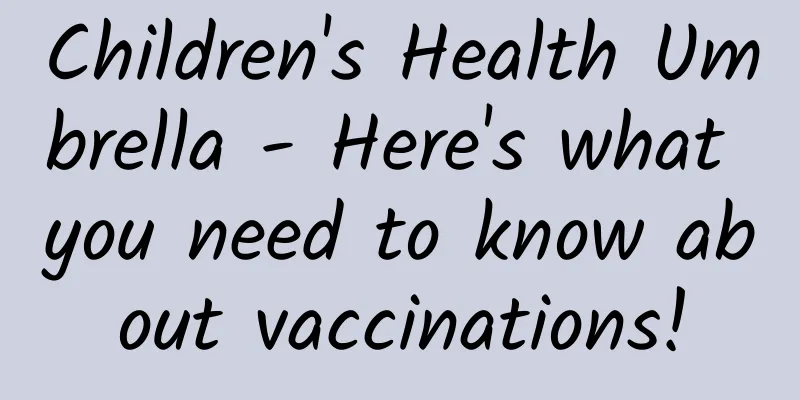The child is actually asking you for help when he/she makes faces and acts naughty.

|
A 6-year-old girl drank milk tea and kept screaming in class... A middle school boy hiccuped when answering questions, but a gastroscopy showed no problem... As soon as the high school senior arrived at the examination room, he raised his eyebrows and twisted his neck like crazy, and he couldn't even finish the exam... These seemingly unrelated symptoms are not "bad habits" but tic disorders , commonly known as tics. This is a neuropsychiatric disease characterized by rapid, purposeless, repetitive muscle contractions. It can occur in children aged 2-21, and is common in children aged 5-10. Tic disorder refers to a neuropsychiatric disease that begins in childhood and is mainly manifested by tics, commonly known as tics. It manifests as sudden, purposeless, rapid, and stereotyped muscle contractions in one or more parts of the body. The incidence rate in boys is significantly higher than that in girls. Tic disorders can manifest in a variety of ways, but are divided into two main forms: motor tics and vocal tics. Motor tics: blinking, sniffing, twisting the mouth, turning the head, shrugging, belly shaking, shaking hands, etc. Vocal tics: throat clearing, coughing, sobbing, meaningless shouting, whistling, imitating speech, etc. Since tic disorders cannot be diagnosed through clear examinations and the symptoms are diverse, it is easy to cause misdiagnosis, which makes many children take a lot of detours. Generally speaking, tic disorders start before the age of 18, most commonly between 4 and 8 years old, with an average age of about 6 years old, and are most serious between 10 and 12 years old. The disease will make children feel ashamed of their illness, and uncontrollable small movements will seriously undermine their self-confidence and self-esteem, causing them to be unwilling to interact with others, and to develop a dislike for school and autism. Secondly, tics are not self-healing diseases . The longer the course of the disease, the more complicated it will become, and it will develop into a refractory tic disorder. On the other hand, the longer the time is delayed, the more comorbidities such as attention deficit hyperactivity disorder, emotional disorders, oppositional defiant, and self-harming behavior will appear, which will seriously affect the child's life and social life. Traditional Chinese medicine has rich clinical experience in treating tics. Children's spleen is often insufficient and liver is often excessive, so regulating the liver and spleen with Chinese medicine is the key to treating the disease. Chinese medicine combined with acupoint massage and acupuncture treatment often has a very good effect. As long as it is discovered and intervened in time, the prognosis of tic disorder is relatively good. The treatment of tics in children must start from the source. Doctors, children, parents, and teachers must work closely together to carefully find and discover the psychological pathogenic factors in the family and school environment, take corresponding countermeasures, and eliminate the pathogenic factors from the source. 1. Develop a regular routine If children are too active and have irregular schedules, they will become overly tired and their cerebral cortex will be overexcited, which will make tic symptoms more likely to worsen. 2. Adjust your parenting style Parents of children with tics often observe that the more they criticize and blame their children, the more severe their tics become. Appropriately relax your requirements and raise your children in a warm and encouraging way. 3. Healthy eating habits Eating fresh fruits and fresh meat that has not been overly processed is more conducive to balanced nutrition. 4. Reduce the use of electronic products It is recommended that the use of electronic products should not exceed 1 hour per day. 5. Help children vent their emotions and create a good family environment Children with tics often experience anxiety and tension, and may even engage in aggressive behavior because they are unable to handle their emotions. Pay attention to your child's emotions and teach them how to properly handle negative emotions. |
<<: If you continue to sleep in this position, your spine will have problems sooner or later!
>>: Oral diseases caused by taking medicine
Recommend
[Medical Q&A] Does frequent urination at night in the elderly mean that their kidneys are not in good condition?
Planner: Chinese Medical Association Reviewer: Li...
How long can pubic lice live?
Pubic lice are a type of insect that usually appe...
How to treat gynecological inflammation?
After girls pass puberty, they are prone to vario...
The distance from the cervix to the vulva
During pregnancy, the distance between the fetus ...
What are the three cups of seasonings in Three Cup Chicken?
We all know that there are many ways to cook chic...
Is it normal for women to have irregular menstruation?
Menstruation is something that a woman must exper...
5-minute breast enhancement tips
The new women in the 21st century are particularl...
What will happen if you drink porridge every day during pregnancy? What are the precautions for drinking porridge during pregnancy?
We all know that there are many things to pay att...
Tips for CT diagnosis of small pulmonary nodules
Small lung nodules are small focal, rounded, and ...
A 26-year-old boy suddenly became unable to move after having his wisdom teeth removed, just because he neglected this matter
If one day you wake up in the morning and find yo...
Will left adnexal cyst affect pregnancy?
Many women suffer from cysts. Some develop cysts ...
So painful! Women can't enjoy going to bed every night
Women who often suffer from insomnia will age fas...
Girls' movements to eliminate trapezius muscles
The trapezius muscle is the muscle of our back. F...
How to solve the problem of oil burning in BMW? How to use BMW car WIFI
BMW has developed from an aircraft engine manufac...
If the thyroid gland is high during pregnancy, will the child be stupid?
When a thyroid cyst is diagnosed during pregnancy...









